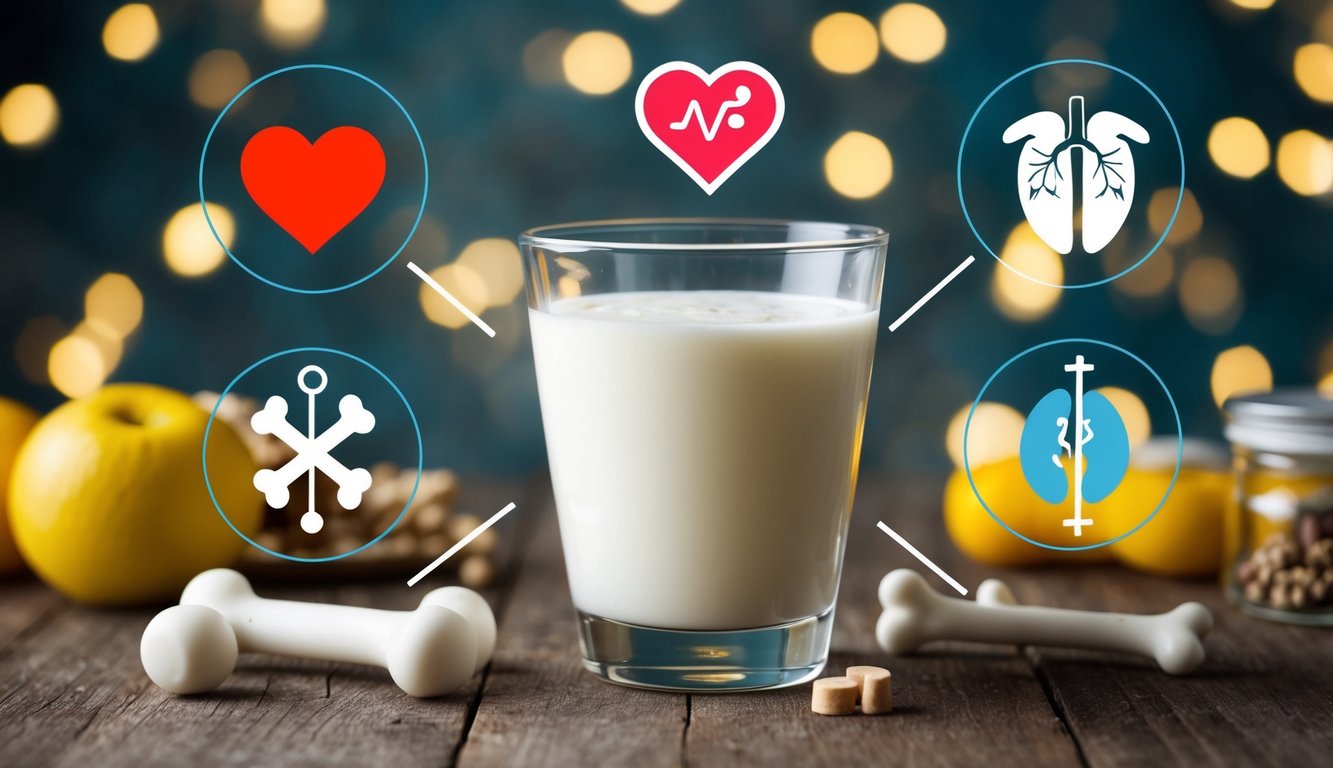Kefir, a popular fermented drink, is gaining attention for its impressive health benefits. Originating from the Caucasus region, this probiotic food is made by fermenting milk with kefir grains, creating a tangy beverage rich in beneficial bacteria and yeasts. Numerous studies show that kefir can significantly boost immunity, improve digestion, and support overall gut health.

In addition to enhancing gut health and immunity, kefir is also known to improve bone health. Packed with calcium and vitamin K2, it may help reduce the risk of osteoporosis. The nutrients and compounds found in this traditional drink make it a versatile addition to a health-conscious diet.
Kefir offers more than just nutritional value. The probiotics in kefir are linked to multiple health benefits, such as reducing inflammation and potentially lowering cholesterol levels. This robust drink not only enriches diet diversity but also supports various physical well-being aspects, making it a wise choice for those seeking to improve their health naturally.
The Nutritional Profile of Kefir

Kefir is a power-packed fermented drink. It provides essential nutrients including vitamins, minerals, protein, and calcium while its fermentation process significantly reduces lactose content, making it accessible for many.
Vitamins and Minerals
Kefir is rich in several vitamins, mainly the B-complex group. B1 (Thiamine) supports energy metabolism, while B12 is crucial for nerve function and blood cell production. This beverage also contains vitamin K2, important for bone health and blood clotting.
In terms of minerals, kefir incorporates calcium, magnesium, and phosphorus. Calcium supports bone structure and teeth, and magnesium plays a pivotal role in muscle function and heart health. Phosphorus works closely with calcium to strengthen bones.
Protein and Calcium Content
Kefir is an excellent source of protein. It contains about 4-6 grams of protein per cup, largely made up of casein—a slow-digesting protein that aids muscle repair and growth.
Calcium content in kefir is significant, typically offering around 20% of the recommended daily intake in each cup. This mineral concentration contributes to enhanced bone density and strength. The bioavailability of calcium is increased through fermentation, making it a highly efficient source for meeting daily dietary needs.
Lactose and Fermentation Process
The fermentation process of kefir significantly decreases its lactose content, making it tolerable for many lactose-intolerant individuals. Kefir grains, a combination of bacteria and yeast, ferment lactose into lactic acid, reducing its concentration.
The process also produces beneficial compounds like probiotics. These assist in digestion and improve gut health. Fermentation transforms kefir into a nutritious beverage that maintains extensive health benefits without the drawbacks of lactose intolerance. The low lactose and high probiotic content ensure that kefir is both highly digestible and beneficial.
Digestive Health and Gut Microbiome

Kefir plays a significant role in promoting digestive health by supporting the gut microbiome and aiding conditions like lactose intolerance. Its probiotic content, particularly Lactobacillus kefiri, contributes to a balanced gut environment and efficient digestion.
Probiotics and Gut Health
Kefir is rich in probiotics, beneficial bacteria that contribute to gut health. These probiotics, such as Lactobacillus kefiri, help maintain a healthy balance in the gut microbiome, which is essential for proper digestion. By enhancing the gut’s bacterial diversity, kefir aids in breaking down food, absorbing nutrients, and protecting against harmful bacteria.
Studies show that regular consumption of kefir can lead to an increase in beneficial bacteria populations. This supports the prevention of digestive issues such as constipation and bloating. Moreover, the probiotics in kefir can strengthen the intestinal barrier, reducing inflammation and improving overall immune function.
Impact on Digestive System
Kefir’s impact on the digestive system is noteworthy due to its fermentation process. This process breaks down lactose, the sugar in milk, making it easier for the digestive system to process. The presence of enzymes contributes to improved nutrient absorption and digestion efficiency.
The fermented milk product helps stimulate the secretion of digestive juices. This further aids in the efficient digestion of various foods. Additionally, kefir has been found to alleviate symptoms associated with common gastrointestinal issues, thereby providing relief from discomfort and enhancing digestive health.
Lactose Intolerance and Digestion
Kefir is particularly beneficial for individuals with lactose intolerance. During the fermentation process, kefir grains break down the lactose content in milk, resulting in lower lactose levels in the final product. This makes kefir a more tolerable option for those with lactose sensitivity.
Furthermore, kefir contains the enzyme lactase, which aids in the digestion of any remaining lactose. This enzyme activity supports better tolerance of dairy products and helps prevent common symptoms such as bloating and gas. By providing a source of essential nutrients without the discomfort, kefir offers a feasible dairy option for many individuals.
Kefir’s Role in Immune Function and Inflammation

Kefir is a fermented dairy product that has been shown to support the immune system and possess anti-inflammatory properties. Its lactic acid bacteria and yeasts contribute to its potential health benefits.
Boosting the Immune System
Kefir contains a wide array of probiotics which play a vital role in maintaining a healthy immune system. These probiotics aid in the production of antibodies and enhance the body’s defense against pathogens.
The presence of beneficial bacteria like Lactobacillus kefiri improves microbial balance in the gut, which is crucial for optimal immune function. Additionally, kefir’s antimicrobial properties help in inhibiting harmful bacteria and viruses, reducing the risk of infections.
Anti-Inflammatory Effects
Kefir’s consumption has been linked to reduced inflammation markers in the body. This fermented beverage contains compounds that can help modulate inflammatory responses, easing symptoms in chronic inflammatory conditions.
Bioactive peptides in kefir have been observed to lower pro-inflammatory cytokines. This effect helps in regulating inflammation, providing relief for individuals with autoimmune disorders or chronic inflammation. Hence, including kefir in the diet can be a practical approach to managing inflammation naturally.
Bone Health and Prevention of Osteoporosis

Kefir supports bone health by aiding calcium absorption and providing essential nutrients like Vitamin K2 and magnesium. These components can have a positive impact on preventing osteoporosis.
Calcium Absorption and Vitamin K2
Kefir contains bioactive compounds that enhance calcium absorption, essential for strong bones. Calcium, a critical mineral, helps maintain bone density.
The fermentation process in kefir produces Vitamin K2, which plays a key role in bone health. Vitamin K2 facilitates calcium’s integration into the bone matrix, preventing it from depositing in the arteries. This helps avert calcification and ensures calcium directly benefits the skeletal system.
Integrating kefir into one’s diet may provide a natural boost to the body’s calcium processing ability, thus supporting healthier bones.
Magnesium’s Contribution to Bone Density
Magnesium, abundant in kefir, is vital for bone structure. It influences the activity of osteoblasts and osteoclasts—cells responsible for bone formation and resorption, respectively. Ensuring adequate magnesium intake can support these functions, maintaining bone integrity.
In individuals lacking sufficient magnesium, bone density may suffer, heightening the risk of osteoporosis. With the natural presence of magnesium in kefir, regular consumption can aid in optimizing these cellular activities.
This helps in preserving bone mass over time and reducing the probability of fractures. Thus, incorporating magnesium-rich foods like kefir supports comprehensive bone health management.
Cardiovascular and Weight Management Benefits

Kefir is not only a fermented dairy product with probiotics but also has promising potential for heart health and weight management. Its nutrients may positively impact cholesterol and blood pressure, while also supporting weight loss through improved satiety.
Heart Health and Cholesterol Levels
Kefir consumption contributes to cardiovascular health by impacting cholesterol levels. Research indicates that the probiotics in kefir can reduce “bad” LDL cholesterol while potentially increasing “good” HDL cholesterol. This balance is crucial for minimizing the risk of heart diseases.
High levels of saturated fats and cholesterol are often associated with compromised heart health. Kefir, with its low-fat content, provides a healthier alternative that supports the maintenance of desirable cholesterol levels.
Additionally, some studies have reported that kefir might help improve blood pressure levels. The bioactive peptides formed during fermentation may have properties that assist in reducing hypertension, further supporting heart health.
Kefir in Weight Loss Strategies
One of the vital aspects of weight management is achieving a state of satiety. Kefir is known for its protein and probiotic content, which can enhance feelings of fullness. This may lead to decreased calorie intake throughout the day.
The role of probiotics in digestion aids in efficient nutrient absorption and metabolism, which are essential for effective weight management. Regular consumption of kefir might also influence body composition by promoting the reduction of body fat percentage.
Incorporating kefir into diet plans can be an effective strategy for those seeking sustainable weight loss. It provides nutritional benefits without the excessive calories found in many other dairy products.
Kefir in Everyday Diet

Kefir serves as a versatile ingredient in many dietary choices, from smoothies to salad dressings. It shares some similarities with yogurt and other fermented foods, but its unique probiotic profile provides distinct advantages.
Incorporating into Meals and Recipes
Kefir can seamlessly integrate into a variety of recipes. Smoothies are a popular choice, with kefir providing a creamy texture and a boost of probiotics. It pairs well with fruits like bananas and berries for a nutrient-rich start to the day.
Salad dressings benefit from kefir’s tangy flavor. When combined with herbs and spices, kefir creates a gut-friendly vinaigrette that enhances the taste of fresh greens. Additionally, kefir can replace milk in pancakes or baked goods, adding a fermented milk twist that’s both delicious and nutritious.
Comparisons with Yogurt and Other Fermented Foods
Kefir often gets compared to yogurt, yet there are notable differences. While both are probiotic foods, kefir generally contains a broader range of probiotic strains, making it particularly beneficial for gut health. Its consistency is more liquid, making it easier to drink or use in recipes.
When compared to other fermented foods like kimchi, kefir is particularly gentle for those new to fermented products due to its mild taste. It serves as a nutrient-rich alternative for those seeking variety in their consumption of gut-friendly foods.







